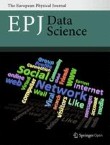High visibility
EPJ Data Science's open access policy allows maximum visibility of articles published in the journal as they are available to a wide, global audience.
Speed of publication
EPJ Data Science offers a fast publication schedule whilst maintaining rigorous peer review; all articles must be submitted online, and peer review is managed fully electronically (articles are distributed in PDF form, which is automatically generated from the submitted files). Articles will be published with their final citation after acceptance, in both fully browsable web form, and as a formatted PDF; the article will then be available through EPJ Data Science and SpringerOpen.
Flexibility
Online publication in EPJ Data Science gives you the opportunity to publish large datasets, large numbers of color illustrations and moving pictures, to display data in a form that can be read directly by other software packages so as to allow readers to manipulate the data for themselves, and to create all relevant links (for example, to PubMed, to sequence and other databases, and to other articles).
Promotion and press coverage
Articles published in EPJ Data Science are included in article alerts and regular email updates.
In addition, articles published in EPJ Data Science may be promoted by press releases to the general or scientific press. These activities increase the exposure and number of accesses for articles published in EPJ Data Science.
Copyright
Authors of articles published in EPJ Data Science retain the copyright of their articles and are free to reproduce and disseminate their work. For further information, see our guide to licensing, copyright and author rights.
For further information about the advantages of publishing in a journal from SpringerOpen, please click here.
